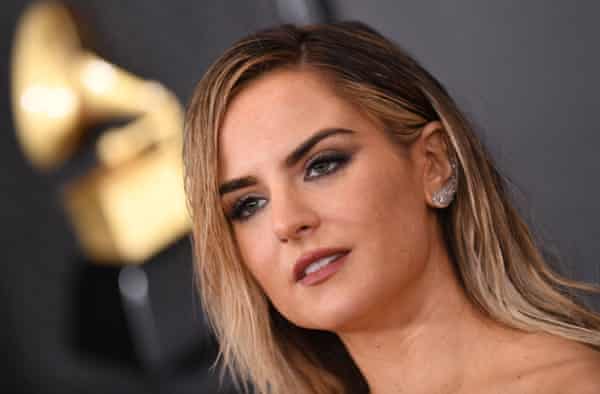‘So much pressure to look a certain way’: why eating disorders are rife in pop music | Music
[ad_1]
For eight years of her life, Demi Lovato was served a watermelon cake for her birthday. This wasn’t a watermelon-flavoured version of a proper cake with all the good stuff like butter, sugar and flour, but rather an actual watermelon with some icing on top.
The reason for this was that her team at the time were “trying to keep her weight down”, according to Lovato’s best friend Matthew Scott Montgomery, who is interviewed as part of Demi Lovato: Dancing With the Devil, the YouTube documentary series premiering this week. Her team would police what she ate, he says, and those she was with were also required to eat only when Lovato ate, with no snacking outside of meals, in an attempt to “keep her well” and avoid triggering a relapse into the restrictive eating disorders she struggled with as a teenager.
That anyone thought it appropriate to put someone who had a history of restrictive eating on a restrictive diet is bizarre enough, let alone the fact it was, in Lovato’s own words, at the hands of a robust team consisting of a wellness coach, dietician, nutritionist and therapist. It’s likely this skewed approach to health is centred on the fact that, as Lovato says in the documentary, “there’s just so much pressure as a female in the industry to look a certain way, and to dress a certain way”. Perhaps unsurprisingly, being in this tightly controlled arrangement led to Lovato relapsing into an eating disorder and breaking her sobriety, which, through a series of events, led to an overdose in 2018 that resulted in three strokes and a heart attack. Doctors said she was minutes away from losing her life.
Lovato isn’t the only music star to have spoken openly about having an eating disorder in recent years. Taylor Swift said she starved herself and excessively exercised as a result of media scrutiny of her body and praise for being a small size from stylists, while Kesha said she also starved herself as she became more famous for fear of becoming “fat”. She told Rolling Stone that she thought: “Pop stars can’t eat food – they can’t be fat”. In his memoir Me, Elton John talked about suffering with bulimia while dealing with the stress of taking out multiple libel writs against the Sun for defamatory stories in the 80s, while Zayn revealed in his memoir that he went for days without eating while feeling a lack of control over his life during his time in One Direction. Other affected artists include Florence Welch, Lily Allen, Olly Alexander, Sam Smith and Halsey.
Research suggests eating disorders are prevalent among musicians. A 2017 study of 301 musicians found that 32% had experienced an eating disorder in their lifetime, and 19% were classed as having one at the time of the survey. This is much higher than statistics that suggest eating disorders affect 1.9% to 5.1% of the British population. While the 2017 study is a small sample, primary care physician Charlie Easmon, who supervised the research, says the results are plausible due to a common trait among musicians and eating disorder sufferers of perfectionism, the expectations of the music industry, and “potential insecurity as a child” that leads to a desire to perform. Other potential contributing factors include food insecurity, trauma and family history.

A theme running through the Lovato documentary is the lack of agency she felt she had day-to-day – an experience shared by interviewees we spoke to for this feature. The pop and R&B singer JoJo, who scored her first hit single aged 13 in 2004, was put on a dangerous 500-calories-a-day diet as a teenager by a label executive who said they wanted her to look “as healthy as possible”; she later developed a binge-eating disorder. Today, she says she has a healthier relationship with food that centres on abundance rather than deficit but adds that she still gets triggered by not “feeling fully in control of how people see you. It’s scary that you don’t get to micromanage every single image that comes out. Needing to be constantly ‘on’ and looking a certain way does have an impact. The music industry is very unpredictable, so I think when you are able to control some aspect of your life – the way you eat, the way you look – then you feel you’re more in control.”
James Vincent McMorrow, a successful Irish singer-songwriter who was treated in hospital for anorexia as a teenager, says trigger points for him today centre on being in the public eye and feeling a lack of control over his own destiny, which can result in body dysmorphia and control issues with food. “When I can control the outcome of a situation, I feel good. And when I can’t, I feel terrible, and that manifests itself in how I see myself in the mirror.”
US singer-songwriter Greyson Chance, who is in recovery from anorexia, says his eating issues stem back to feeling a lack of control over some of his relationships and his career. “I could control where that scale went,” he says, describing the machine around him: “Ten to 20 people at the label saying, ‘This is where we think you should go’; and you have management, an agent, business managers. Musicians feel as if they are in a world where they don’t have a lot of control and they’re searching for things that they can control. That’s what it was for me.”
Musicians’ psychotherapist Tamsin Embleton backs this up: “Disordered eating patterns give the illusion of being in control when everything around you feels chaotic, unmanageable, changeable.” However, as she points out, “eating disorders manage you, not the other way around”, and when your brain and body are malnourished, they won’t be functioning at their best, which is likely to have a knock-on impact on a musician’s ability to perform, create and generally live a happy and balanced life. Left untreated, eating disorders have the highest mortality rate among psychiatric disorders.

Body positivity and intuitive eating have gained traction in recent years, but the music industry, and culture at large, can still feel unwelcoming to anyone in the public eye who doesn’t fit a tightly defined “ideal” image – and praise is still heaped on those who do. This is an issue Nashville artist Kalie Shorr has reckoned with. After struggling with anorexia in her teens, an executive at her former publishing company praised her for the way she looked while putting down a fellow female artist for having a different body shape. “He was not just comparing me to another girl, but comparing me to a junior in high school, a child, and calling out her body.”
An experienced music publicist who has worked in record labels adds: “There aren’t many fat people in record labels, so you’ve got a lot of unconscious bias from the staff. If they have an artist who was what would be considered a non-standard size, and might be a little bit bigger, they’d be like, ‘Oh God, we can’t get any clothes for them.’”
It’s not just musicians who are affected by this culture. Young impressionable fans who want to be like their heroes, the majority of whom have this idealised image (which is likely to be airbrushed and filtered), can easily follow the well-worn path from dieting to disordered eating. Anne Helen Peterson has written about how the desire to emulate Britney Spears’ washboard abs led her to excessive exercise and a “deeply disordered relationship with food”.
Shorr remembers being influenced by Swift’s thin frame as a teenager. “It was so hard to not compare myself to this person who I just adored and read all her interviews, bought all her magazines, and knew every word to all of her songs.”
Eating disorder charity Beat says stereotypes about who gets eating disorders might make them harder to spot among ethnic and cultural minority groups, too. In her Homecoming documentary, after giving birth to twins, Beyoncé steps on the scales and declares the number “every woman’s worst nightmare” before embarking on an extremely restrictive diet in order to prepare for Coachella. Troye Sivan, meanwhile, has spoken about the “intense pressure” to look a certain way that exists in the gay community. The body image stakes may differ between cultures and communities, but the message remains clear: bodies need to be controlled in order to be considered acceptable.
There are signs of change. The publicist says the success of artists such as Adele and Rag’n’Bone Man made labels realise they could market artists who didn’t have to look as if they were models. (Despite Adele’s recent weight loss, they express hope that her “legacy means that everything has shifted for good”.) JoJo agrees: “There are so many examples of women and men doing incredibly well in mainstream pop music that have all different types of body shape. Within the past 10 years, there has been a shift for the better. If you feel great about yourself, that’s what people are going to be drawn to and resonate with.”
Lovato is a case in point: by the end of the documentary series, she’s working with a new team, has cut her hair short, is experimenting with her sexuality, living in her dream home and eating whatever she wants, reclaiming agency over her body and her life. “The best part about my life today is that I’m in control of it and what I eat is my decision, what I don’t eat is my decision, and what I do is my decision,” she says triumphantly.
[ad_2]
Shared From Source link Arts